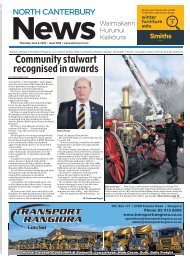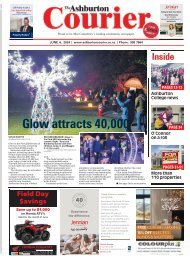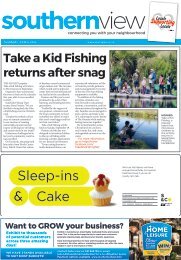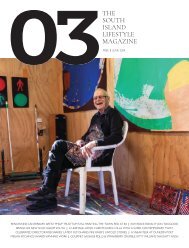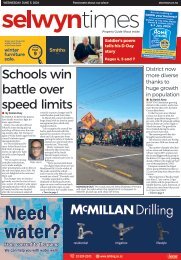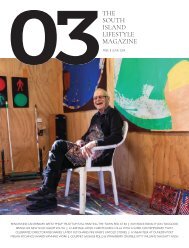The Star: May 31, 2018
Create successful ePaper yourself
Turn your PDF publications into a flip-book with our unique Google optimized e-Paper software.
motoring<br />
7<br />
Price – Ford Ranger Wildtrak, $69,640<br />
Dimensions – Length, 5351mm; width, 1860mm; height, 1848mm<br />
Configuration – Five-cylinder, four-wheel-drive, <strong>31</strong>98cc, 147kW, 470Nm, six-speed automatic.<br />
Performance – 0-100km/h, 10sec<br />
Fuel usage – 8.9l/100km<br />
By RoSS KIddIE<br />
I’m still amazed that a light commercial<br />
utility is the top selling vehicle in New<br />
Zealand.<br />
I guess I shouldn’t be that surprised,<br />
it is the same scenario in many overseas<br />
countries, however, for many years<br />
mainstream cars were the dominant sellers<br />
here.<br />
That has all changed recently, Ford’s<br />
Ranger has stolen the top spot and it<br />
dominates new vehicle sales. However,<br />
Ford can’t be complacent with Ranger,<br />
Toyota’s Hilux and Holden’s Colorado are<br />
lurking in its shadows and if you add in<br />
Mitsubishi’s Triton, Nissan’s Navara and<br />
a host of others from lower in the price<br />
range, the choice of ute in New Zealand<br />
is overwhelming. Add in, too, the new<br />
prestige X-Class ute from Mercedes-Benz<br />
and Ford will have to work hard to keep<br />
Ranger in a dominant position.<br />
It’s fair to say that Ranger hasn’t changed<br />
a lot mechanically since it became popular<br />
four years ago, but it has been refreshed<br />
considerably all along its journey.<br />
This evaluation focuses on the Wildtrak<br />
version. It’s an upmarket model with all<br />
the bells and whistles you are ever likely<br />
to find in a ute. Actually, it’s almost unfair<br />
to call the Ranger a ute, other than its<br />
length of over 5.3m, it is almost car-like to<br />
drive. I say that taking into consideration<br />
it is engineered for load carrying, but<br />
the Ranger is very sophisticated for what<br />
could be loosely termed a truck.<br />
<strong>The</strong> Ranger is also a lot<br />
more comfortable than<br />
ever before, thanks to<br />
the continual process<br />
of refinement that<br />
has gone into its<br />
manufacturing<br />
process, it is quieter<br />
as a vehicle and<br />
there’s been a<br />
greater emphasis on<br />
eliminating road and<br />
wind noise.<br />
<strong>The</strong> Ranger also has<br />
a controlled ride, I had to<br />
keep reminding myself that<br />
there was a deck area behind the rear<br />
seats; it is smooth in its delivery, yet it is<br />
the quintessential model for work and<br />
recreational use.<br />
Up front sits a five-cylinder<br />
turbocharged diesel engine which harks<br />
back to Ford’s Transit programme. I’m a<br />
bit of a five-potter fan, and the 3.2-litre<br />
unit lives up to all expectation. It is strong<br />
toP SELLINg<br />
utility vehicle<br />
and smooth and, other than a gruff growl<br />
under load, it is quiet and efficient.<br />
Ford rates it at 147kW with 470Nm of<br />
torque, which are strong outputs capable<br />
of claiming an under 10sec time to make<br />
100m/h from a standstill.<br />
On the subject of figures, Ford also<br />
claims an 8.9-litre per 100km (32mpg)<br />
combined cycle fuel usage average. <strong>The</strong><br />
trip computer was constantly listing<br />
around 10.3l/100km (27mpg)<br />
during my time with the<br />
evaluation car.<br />
<strong>The</strong>se figures are for<br />
an unladen vehicle, it<br />
must be taken into<br />
account the Ranger is<br />
classed with a 3500kg<br />
tow figure along with<br />
a payload weight of<br />
835kg.<br />
<strong>The</strong> Ranger comes<br />
with a six-speed<br />
automatic gearbox, it is<br />
characterised by smooth shifts<br />
and ratios which don’t load the<br />
engine, it is happy to work tirelessly low<br />
down and responds quickly to throttle<br />
request with strong turbo boost.<br />
Underneath, the Ranger’s suspension is<br />
strictly working class. It’s a front-wishbone<br />
system with a live rear axle located by leaf<br />
springs. That’s the traditional load bearing<br />
design, yet it works well, the suspension<br />
isn’t firmed dramatically, instead the ride<br />
is comfortable and controlled with just<br />
a small jiggle or two transmitted incabin<br />
over the worst of our uneven road<br />
surfaces.<br />
<strong>The</strong> Ranger gets an electronically<br />
controlled transfer system. In typical fourwheel-drive<br />
fashion there’s a high and low<br />
ratio drive system easily manipulated by a<br />
control console dial.<br />
According to the terms of Ford’s loan<br />
agreement, I wasn’t able to take the test<br />
vehicle off-road, but I did descend a<br />
short incline into a into a new housing<br />
development to take photos. Between<br />
the hill descent control system and the<br />
seriously low ratio mechanism, serious<br />
off-road travel is a given. Consider as well,<br />
Ford claims a 237mm ground clearance<br />
figure.<br />
In terms of on-road handling, the<br />
Ranger steers with well-weighted steering<br />
and directional accuracy not always found<br />
in the traditional double-cab ute.<br />
A work colleague purchased a new<br />
Ranger a year or two back, and while it<br />
is his quintessential family vehicle, it is<br />
frequently put through its paces off-road.<br />
He, like many other buyers, has discovered<br />
that the double cab format can used in<br />
many roles.<br />
It’s that versatility that has made Ranger<br />
and most other utes in today’s market the<br />
vehicle of choice. I can’t see that scenario<br />
changing any time soon.





